November 2023, Meet The Memory Person – a collaborative remembrance project
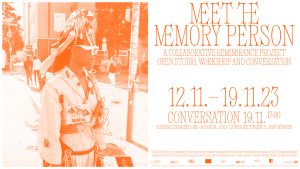
Meet The Memory Person - a collaborative remembrance project: open studio, workshop and conversation (Venue: FLORIDA Lothringer 13 81667 München, Ein Kunstraum der Stadt München)
Artistic concept: Franziska Windolf
Curation: Mareike Schwarz
Munich’s Florida organisation will host Meet the Memory Person, a gathering to develop and envision the future of the collaborative and performative monument, initiated in Giesing in 2023 and dedicated to artists of all kinds who are living in exile or have migrate(d) to/from Munich, in particular Giesing. Workshop: Sunday, 12.11.2023, 11am-3pm The event starts with a workshop featuring creative guests from Giesing who have a connection to migration and exile and have encountered the Memory Person during their public performances. Open studio: to further extend collaboration on the monument, everyone is welcome to register for the 'Open Studio' from Monday, 13.11.23 - Saturday, 18.11.23. Materials and tools are available, and the artist will be present and looking forward to conversation and creativity. Contact franzi.windolf@posteo.de. Conversation: Sunday, 19.11.23, 5pm With Burcu Dogramaci, Laura Bruns, Cathrine Bublatzky, Clara Laila Abid Alsstar and Franziska Windolf. This event will also launch the Meet The Memory Person catalogue, with drinks and snacks!





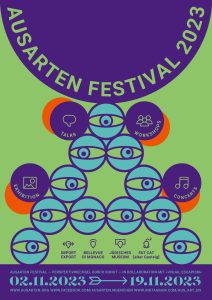
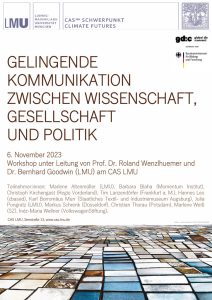 On 6 November, practitioners from all areas of science communication met at CAS@LMU to discuss the current state of the field, persisting challenges as well as possible ways to overcome them. A particular focus of the exchange rested on the role and perspectives of the Humanities in the broader field of science communication.
Organisers: Roland Wenzlhuemer and Bernhard Goodwin
Venue: Center for Advanced Studies LMU Munich
On 6 November, practitioners from all areas of science communication met at CAS@LMU to discuss the current state of the field, persisting challenges as well as possible ways to overcome them. A particular focus of the exchange rested on the role and perspectives of the Humanities in the broader field of science communication.
Organisers: Roland Wenzlhuemer and Bernhard Goodwin
Venue: Center for Advanced Studies LMU Munich 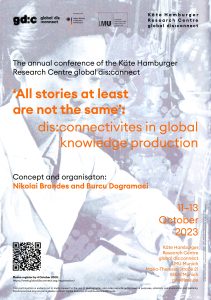 'All stories at least are not the same': dis:connectivities in global knowledge production
'All stories at least are not the same': dis:connectivities in global knowledge production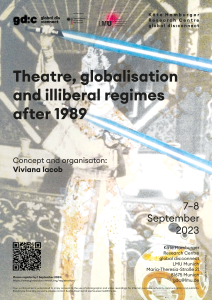 The war in the Ukraine has highlighted the globalising propensities of non-democratic states such as Russia, China and Iran. There is a strong sense that illiberal, global interconnections are being (re)forged. These alternative globalisations are reflected in the dynamics of specific theatre cultures and are rooted in the trans-continental links established during the Cold War.
The war in the Ukraine has highlighted the globalising propensities of non-democratic states such as Russia, China and Iran. There is a strong sense that illiberal, global interconnections are being (re)forged. These alternative globalisations are reflected in the dynamics of specific theatre cultures and are rooted in the trans-continental links established during the Cold War. From 24-27 July, global dis:connect will welcome MA, doctoral students and creative professionals in all stages of their careers for a summer school on the absences produced by globalisation processes, focusing on the Mediterranean, particularly on the aspects of migration, tourism and (post)coloniality, in the past, present and future.
From 24-27 July, global dis:connect will welcome MA, doctoral students and creative professionals in all stages of their careers for a summer school on the absences produced by globalisation processes, focusing on the Mediterranean, particularly on the aspects of migration, tourism and (post)coloniality, in the past, present and future.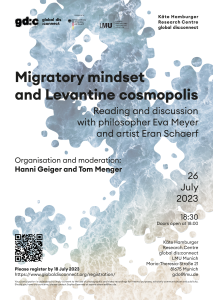
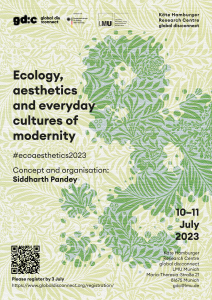
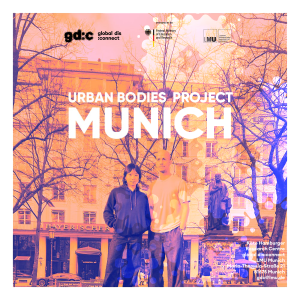 The audience will listen to audio files — a fusion of historical facts, personal biographies, music and interviews — through headphones while walking from site to site. A performative utopia of dance will emerge in which urban space is occupied and intervened with dance and bodies. History will become present, and memorial sites of Munich will become visible.
The audience will listen to audio files — a fusion of historical facts, personal biographies, music and interviews — through headphones while walking from site to site. A performative utopia of dance will emerge in which urban space is occupied and intervened with dance and bodies. History will become present, and memorial sites of Munich will become visible.